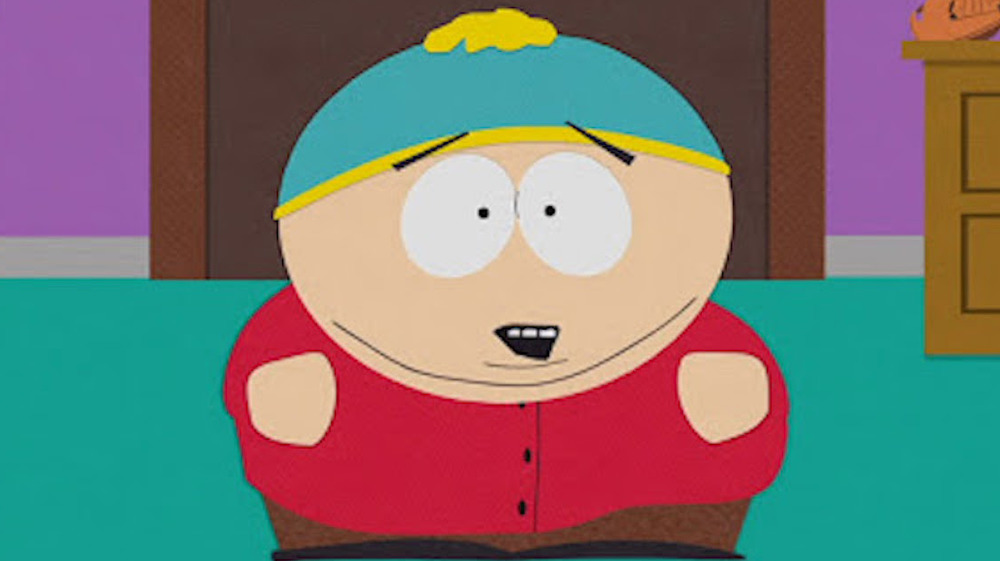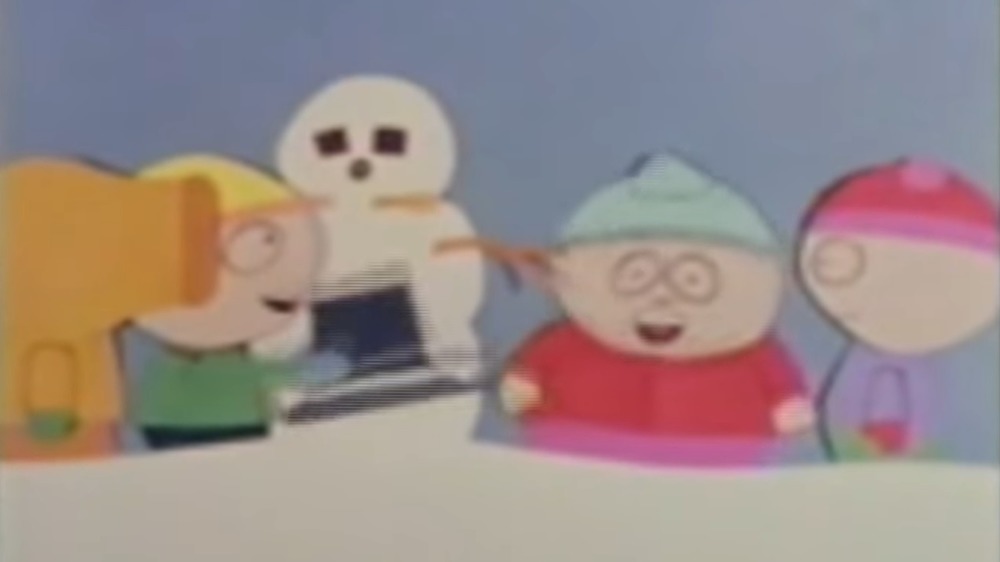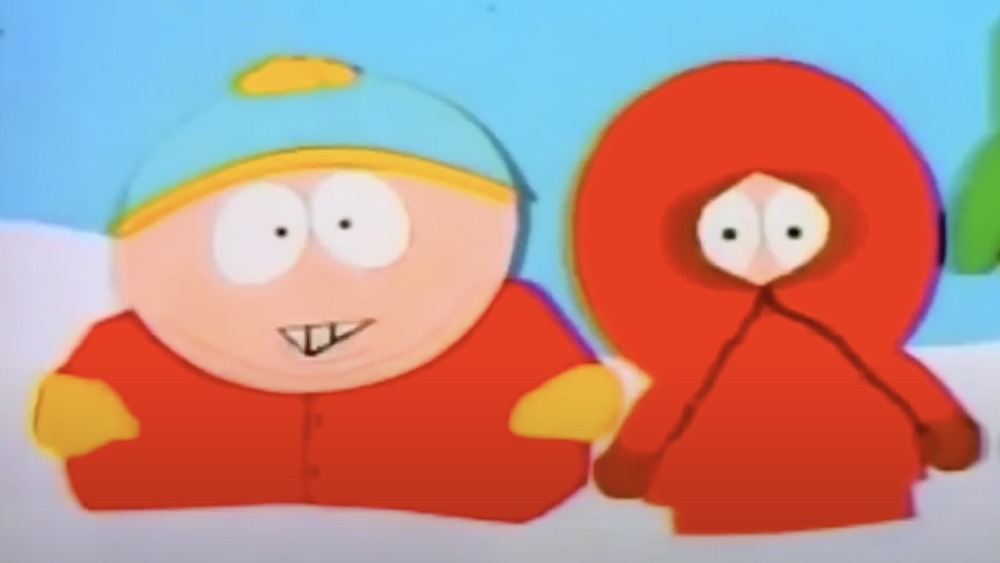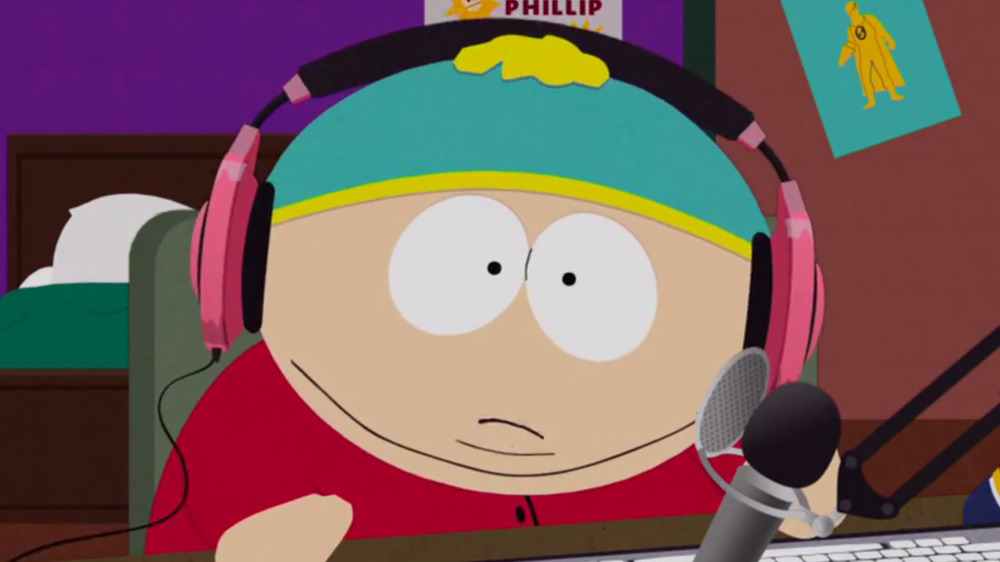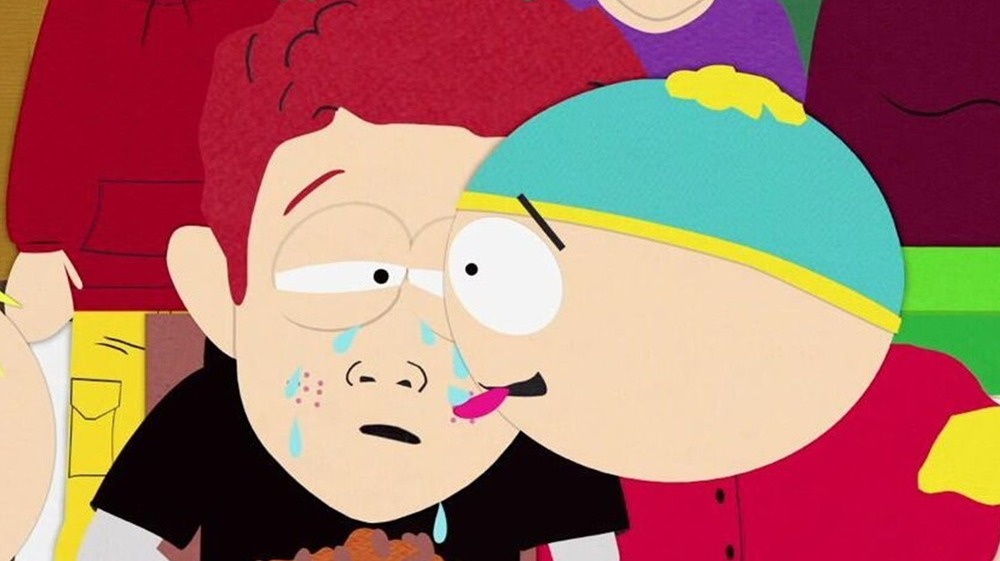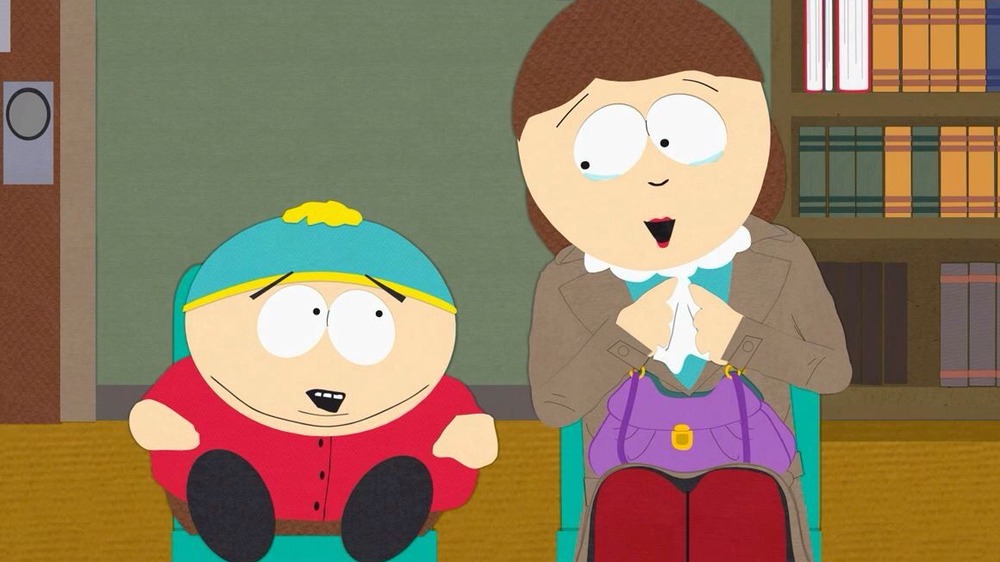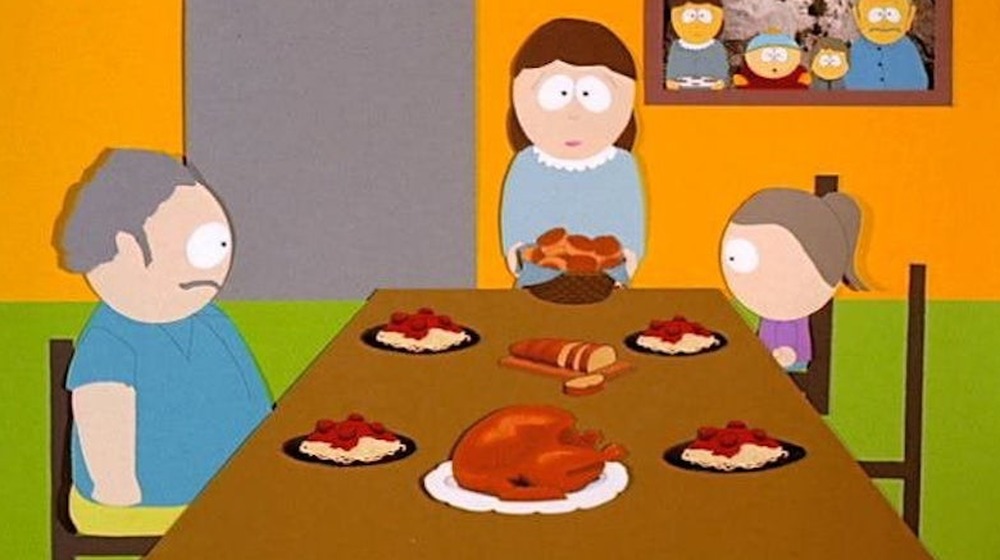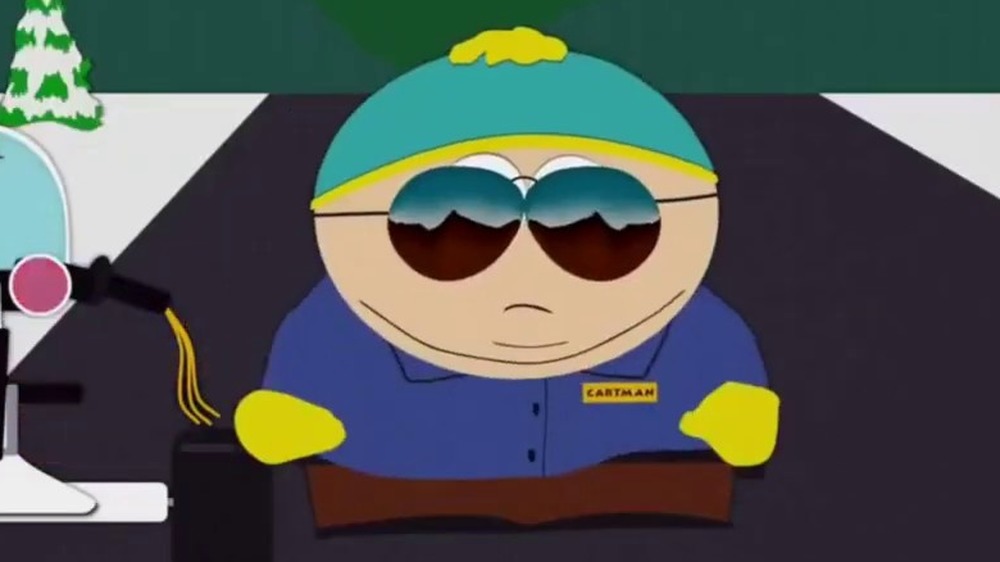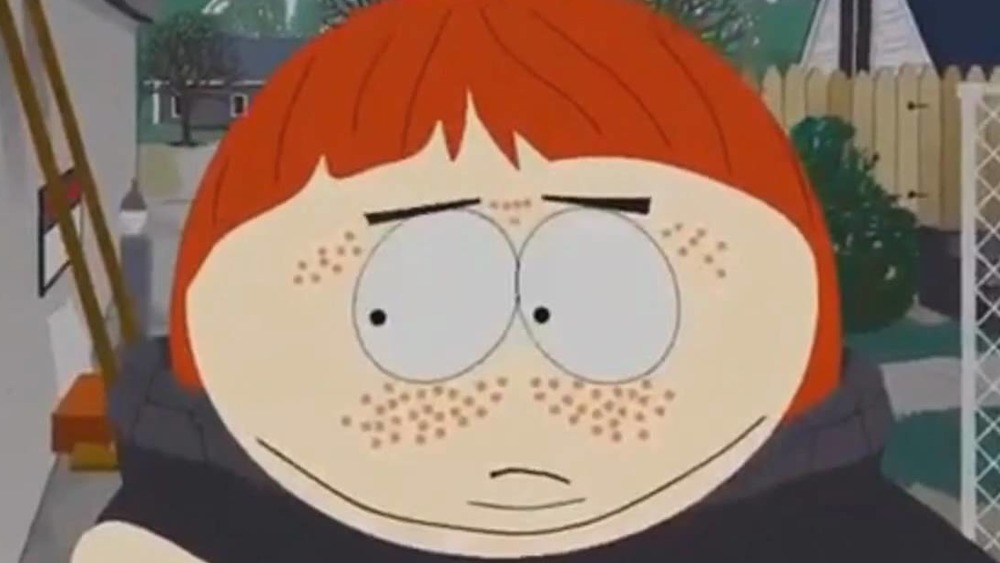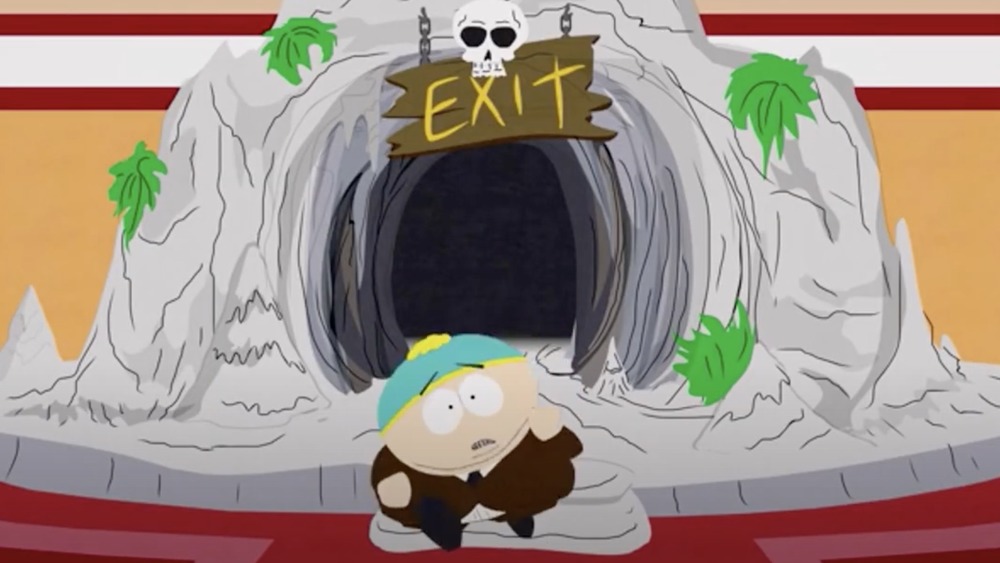The Untold Truth Of Eric Cartman
South Park is one of the most successful and influential TV shows of all time. Since 1997, the Comedy Central animated series has skewered, criticized, and sent-up most every part of modern life, generally through the eyes of four nine-year-old boys trying to make sense of the world from their tiny Colorado hometown. And one of those kids in particular is extremely important to the show's success (or infamy). He's both a protagonist and one of the all-time best screen villains — that's right, we're talking about Eric Cartman.
Cartman is a monster in every regard, a toxic little nightmare full of selfishness, narcissism, and ruthlessness. He's a kid who will stop at nothing to get what he wants, no matter what. And if you try getting in his way, or if you make a crack about his weight, well, that will certainly lead to your doom. Amazingly, all of these traits make Eric Cartman extremely funny. He's just so awful that you can only laugh. There's certainly never been a character on TV quite like Cartman, and there's a lot about this little psychopath that South Park fans don't know. So grab your best friend, Clyde Frog, and a bag of Cheesy Poofs, tell the kitty to stay away from your pot pie, and read all about the origins, secrets, and impact of Eric Cartman.
Oh my god, they killed Cartman!
Long before South Park creators Trey Parker and Matt Stone made a single episode of their long-running cartoon series, they made animated shorts at the University of Colorado starring a familiar-looking group of parka-clad kids who appeared like they belonged in an old Charlie Brown holiday special. However, it should go without saying that these kids were doing and witnessing some very un-Charlie Brown-like activities.
Parker and Stone's four-minute long 1992 project, "The Spirit of Christmas" (also known as "Jesus vs. Frosty"), opens with the four instantly recognizable South Park boys, including a heavyset one in a red coat and light blue hat. That's obviously Eric Cartman, more crudely rendered than he would be on the higher-budgeted Comedy Central series. Soon enough, the boys start singing "Frosty the Snowman" and put what's apparently a magic hat on a snowman ... which turns him evil. The creature then immediately picks up the kid closest to him. "Oh my God!" the boy who would one day be Kyle proclaims in a primitive version of what would become a South Park catchphrase, "Frosty killed Kenny!"
However, the kid who would later be known as Kenny is still standing there, enrobed in his orange jacket. So, who are we talking about here? Well, lying dead in the snow, bleeding massively from his head, is the overweight boy in the red sweater. That's right, before he was redubbed Eric Cartman, our chubby little psycho was the character known as Kenny.
The first real appearance of Eric Cartman
It probably won't come as much of surprise to learn that 1992's "The Spirit of Christmas" — aka "Jesus vs. Frosty," the cheaply animated, anarchic student film that looks like a Christmas TV special before turning violent and controversial — became an underground hit in animation and entertainment circles. And in 1995, Fox Network executive Brian Graden saw the animated short and commissioned "Jesus vs. Frosty" creators Trey Parker and Matt Stone to make a new one.
With a budget of $1,000, the duo got to work on what Graden intended to serve as a Christmas card in video form that he would send to friends and colleagues. And soon enough, Parker and Stone had made another film titled "The Spirit of Christmas," only with much higher production values and a few other changes. This time, the central — and bloody — conflict is between the two big icons of Christmas, with Jesus Christ representing the religious side of the holiday and Santa Claus standing up for the secular side.
In this short, the four South Park boys look exactly like they'd eventually be portrayed on the Comedy Central series. Many of the character hallmarks are present, and Kenny, Kyle, and Stan are all referred to by name. Granted, Eric Cartman isn't named, but he's distinctively Cartman, teasing Kyle for being Jewish and then unleashing righteous anger and a slew of F-bombs when Kyle retaliates against the anti-Semitism by mocking Cartman's weight.
How Trey Parker devised Cartman's voice
Eric Cartman is an exceedingly fleshed-out character, and when he appeared for the first time under his actual name in the very first episode of South Park, 1997's "Cartman Gets an Anal Probe," he was already fully formed by showrunners Trey Parker and Matt Stone. A lot of what makes Cartman so unique comes from his voice, and it's one that perfectly complements the character's appearance and personality. He's a pre-pubescent kid, but he speaks with a throaty, raspy, world-weary tone. But at the same time, his voice is also high, whiny, and carrying hints of both Louisiana and Deep South accents, even though the character hails from the Rocky Mountains. So where did this particular tone come from?
South Park co-creator Trey Parker voices Cartman and also devised the characterization. When he and Stone were studying at the University of Colorado decades ago, the duo "would talk with just kind of this annoying, high-pitched voice and make our film teachers angry," Parker told NPR's Fresh Air. That became the basis for Cartman's voice, which Parker told Yahoo! Internet Life is mostly just "Stan's voice," which he also performs, "but adding a lot of fat to it." When recording audio early on in the show's history, Parker would lay down his lines on analog tape, and then he would pitch-shift it to make his voice higher, so that it would sort of sound "like a kid." After a while, and as technology progressed, South Park moved to digital audio recording, and now, Parker uses Pro Tools to alter his own voice into Cartman's.
How Eric Cartman became Eric Cartman
Perhaps the most shocking thing about Eric Cartman is that he doesn't exist in a bubble. What do we mean by that? Well, he's not entirely the invention of South Park writers. As it turns out, a real person inspired the name of the character but only a shred of Eric Cartman's personality. Just after finishing the second proto-South Park short for Brian Graden, Parker and Stone attended a 1995 Super Bowl party with collaborator Jason McHugh and some of his old high school friends. Among the attendees was a fellow named Matt Karpman, whom McHugh described on a GoFundMe page as "super obnoxious" and "famous for his zinger comebacks." After a big play during the game, Karpman tried to get some high fives, but he was denied, prompting someone to yell, "Shut up, Karpman." Suddenly, Parker — from the fringes of the party — called out, "Cartman! That's the perfect name for the fat kid!"
However, Matt Karpman wasn't the only inspiration for the chubby cartoon character. In fact, the South Park showrunners subconsciously drew inspiration from one of the greatest characters in TV history. See, it wasn't until a few episodes of South Park had been produced that Parker and Stone figured out who'd actually influenced the Cartman character. "I'd say within the first season, we kind of realized Cartman's like a little Archie Bunker," Parker said (via NPR), referring to the loudmouthed, proudly bigoted character at the center of the 1970s generation gap sitcom All in the Family. "We were going back and seeing some of those reruns, and we kind of realized what we had there."
The story behind Cartman's most shocking moment
The 2001 installment "Scott Tenorman Must Die" remains one of the most infamous episodes in South Park history. After older kid Scott Tenorman repeatedly humiliates him, Eric Cartman arranges for Scott's parents to be shot to death, steals their corpses, mutilates them, makes them into a chili, and then feeds the dish to the now-orphaned boy. (Later on, South Park reveals that Scott's dad, Jack Tenorman, is Eric Cartman's biological father, adding another layer of evil to the kid's twisted revenge plot.) According to South Park co-creator Trey Parker, Cartman's actions in "Scott Tenorman Must Die" are the worst things the character has ever done, which is really saying something. "We had that idea, and we thought it was really funny, but then we were like, 'Well, we're setting a new bar now,'" Parker told NPR's Weekend Edition.
Some of the show's writers weren't sure if this was an episode they should even produce, and they reached a compromise by agreeing that Cartman could carry out these unspeakable acts so long as he didn't murder the parents himself. "But you could obviously see how if they were going [to] be dead, he could feed them [to an enemy]," Parker added. "So we debated it for a long time, and then we did it." Forcing a kid to devour his own family members also represented a major turning point in Cartman's character development. "From that point on, he just got darker," Parker told the New York Post.
He's a satirical comment on modern parenting
Older or more astute South Park viewers might be left wondering how Eric Cartman is the way he is. Seriously, why is this little kid so mean, obnoxious, rude, selfish, racist, anti-Semitic, violent, and evil? Is he just naturally this way, or did something trigger his behavior? Or is it all just the result of permissive parenting, a lack of boundaries, and other non-strict forms of adult guidance? Well, according to South Park creators Trey Parker and Matt Stone, Eric Cartman's personality is one big, extreme example about what can happen if certain modern parenting techniques are carried out and unchecked — a style they see day-to-day in Los Angeles.
Liane Cartman gives her son whatever he wants and quickly, from junk food to toys, and she's unfailingly kind and patient, despite his constant verbal abuse. "We always had this thing where Cartman's mother was so sweet," Parker told NPR, going on to add, "And I don't know if it's worse in L.A. than most places in the country — I hope so — but [we've met] so many parents who were just so desperately trying to be friends to their kids. And it was the thing we really picked up on." As a result, Parker and Stone have been using Cartman to suggest that never pushing back, letting children do whatever they want, and allowing them to get away with it will lead to "really evil kids."
The missing family of Eric Cartman
Of the four main kid characters on South Park, three of them — Stan, Kyle, and Kenny — live in two-parent homes with their mothers and fathers and at least one sibling, each under one roof. Eric Cartman's family setup is a little different, but it still seems like a run-of-the-mill one. He lives with his mother, Liane Cartman, and his father (or a father figure) is never in the picture. However, while you'll find a lot of families like that across America, the Cartman family is still, well, rather unique.
For many years, South Park explained that Eric Cartman's mother possessed both sets of reproductive organs, and that she was technically his father. But then the show revealed that Liane is, in fact, the character's mother, and she'd gotten pregnant after an affair with former Denver Broncos player and South Park resident Jack Tenorman.
But wait, Eric Cartman's lineage gets even more complicated. As it turns out, he had a live-in dad and a sister at one point. The unaired pilot of South Park is essentially the 1997 debut episode "Cartman Gets an Anal Probe," but it contains some footage that was deleted prior to its airing on Comedy Central. Among the excised material is a scene at the Cartman family dinner table, which includes Eric, Liane, and an unnamed Cartman father and Cartman sister. The characters were cut from the pilot, and they never appeared on South Park again.
His popularity in the U.K. grew to uncomfortably high levels
Upon its cable TV debut in the summer of 1997, South Park became a massive pop cultural phenomenon. The show scored huge ratings, merchandise sold briskly, and millions of fans devised hilarious impersonations of Eric Cartman, the wonderfully horrible breakout character. All of that was reflected in a summer 1999 poll by the U.K.'s NatWest Bank. Cartman topped the list of Britain's ten most popular pop cultural personalities, beating out the likes of Bart Simpson, James Bond, and Jennifer Aniston.
The one problem with this? NatWest polled eight- and nine-year-old kids in order to determine the most popular figures in children's television. South Park, what with its rampant cursing, frank dialogue, and provocative subject matter — much of that coming from Cartman himself — isn't a kids' show, and at the time of the poll, it aired late at night in the U.K. In other words, the poll suggested that South Park was an underground, secretly watched smash hit among the very young in the U.K. Cartman would've been proud.
Eric Cartman's prejudice had real-life ramifications
Probably the most overarching element of Eric Cartman's character is that he is full of hatred, consistently exhibiting deep-seated racism, sexism, and anti-Semitism. Cartman even carries a prejudice against people with naturally red hair. In the 2005 episode "Ginger Kids," Cartman gives a nasty class presentation on how redheaded people — or "gingers," as he derisively calls them — are innately evil, and their orange-tinged hair is a manifestation of their lack of a soul. He's then transformed into a redhead after a random attack of "Gingervitus," but he learns almost nothing about the error of his ways.
What was supposed to be a South Park episode satirizing hate actually gave birth to Cartman-like anti-redhead sentiment in the real world. According to Canada.com, in 2008, the Royal Canadian Mounted Police investigated a 14-year-old boy in British Columbia who ran a Facebook page called "National Kick a Ginger Day," with which he urged 5,000 members to "get them steel toes ready" in advance of the November 2008 event. The group became a small phenomenon across Canada, to the point where schools had to threaten discipline if anyone actually kicked a redheaded classmate. Nevertheless, two kids in Alberta were assaulted on the day in question. The owner of the Facebook group offered a blanket apology. "It was a joke," he said. "I'll message everybody and say I'm sorry that this offended people."
Eric Cartman put Casa Bonita on the map
There's no actual place called South Park in Colorado, but South Park writers try to add a little truth to the animated series now and then by featuring real-life landmarks. Perhaps the most famous example of this is a Mexican restaurant in Denver called Casa Bonita. In the 2003 episode "Casa Bonita," Kyle plans to celebrate his birthday at the local favorite, which offers "food and fun in a festive atmosphere," but he purposely doesn't invite Cartman. It's revenge for his rampant teasing and anti-Semitism. The episode culminates in Cartman fleeing the police, but before his capture, he runs into Casa Bonita and enjoys all of its activities as quickly as possible — Black Bart's Cave, waterfalls, cliff divers, a puppet show, and an Old West photo booth.
Casa Bonita is just about Eric Cartman's favorite place on Earth, and the exposure and endorsement from South Park and its most notorious character made the restaurant-meets-amusement park a world-famous tourist attraction. As a result, Casa Bonita management keeps an eye on the TV listings to see when Comedy Central reruns the "Casa Bonita" episode so they can plan accordingly for a boost in business. In the immediate time period after it re-airs, Casa Bonita may experience about a 10% increase in sales. As a nod to its fictional, unofficial spokesman, the eatery placed a stuffed Cartman doll near its cliff-diving platform.
